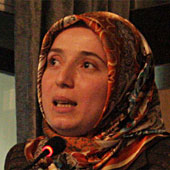Turkey’s Conundrum: Women and Modernity
How did Turkey’s ban on head scarves inhibit the advancement of women’s rights?
April 9, 2013

Religious head scarves were banned during the periods when secular institutions such as the military dominated Turkey’s government. The so-called “postmodern coup” of February 28, 1997 brought an end to the coalition government led by the Islamist Welfare Party (RP) and imposed a strict ban on head scarves, under the pretext of protecting the secular regime.
The net result was that women wearing head scarves were systematically prevented from entering places considered to be part of the “public sphere,” including universities. The clear goal was to reduce their visibility in public.
The ban polarized Turkish society. Proponents argued that the modern Turkish woman had no use for head scarves and that scarves were political tools to subvert the secular, democratic order. Meanwhile, nobody really cared about how women felt about changing outfits and uncovering their heads at the door of their workplace or school, as if living with a double personality.
By the end of 2010, universities had for the most part lifted the head scarf ban in Turkey — though it continues in many spheres of employment.
With the ban lifted, there are no longer tensions over dress code. And previous claims that allowing female students into universities who had their heads covered would unfairly pressure uncovered ones and violate Turkey’s national secular identity have all but completely lost legitimacy.
However, those 13 years of bickering over whether women wearing head scarves should be allowed in places of higher education have not only interrupted many women’s education, it also wasted Turkey’s time and energy.
While the polarized public debated the head scarf ban, often vehemently, it overlooked much bigger issues that limited the economic, social and political potential of women. For instance, rising female unemployment and low economic power hinder the proper unfolding of women’s rights.
Without true empowerment of women, the prospects for Turkey’s long-term development and future welfare are limited at best.
In any country, the ability of women to exercise their rights is obviously contingent on their level of personal wealth. However, Turkish women all too often have neither a regular income nor sufficient financial means inside or outside of their families.
For example, the labor force participation rate of women is only 27% in Turkey, despite efforts to incentivize women to join the workplace. In Indonesia, another predominantly Muslim nation, the female labor participation rate is 60%.
Women’s political participation is also hampered. There is only one female governor in Turkey’s 81 provinces, and there are only 20 female provincial district governors in the country’s 918 districts. Of the 25-member Council of Ministers, only the minister of family and social policies, Fatma ?ahin, is a woman.
Women who wear head scarves are still not permitted in political life. Women wearing head scarves also continue to be discriminated against in Turkey’s job market. With few exceptions, it is impossible for a woman wearing a head cover to work in public institutions. As for the private sector, women wearing head scarves are generally unwelcome. If they are employed, they are given obscure jobs and lower wages.
As long as women in Turkey are subjected to different treatment contingent on their choice of dress, debates over the head scarf will obscure genuine problems with regard to the status of women in Turkish society and ultimately delay concrete solutions.
Modernity cannot be measured by one’s choice of clothing. Recognizing individual rights through legislation or international treaties is insufficient. Hence, effective measures must be taken in order to enable any person to exercise his or her liberties without being subjected to discrimination or obstruction.
Ultimately, a society that does not safeguard the rights of half of its population cannot realize its full potential. A truly prosperous future will be delayed until that is changed. Turkey — and the world at large — must not stop at laws supporting women’s rights, but should also take action to facilitate their practical application.
It is also important for Western audiences to understand that their instinctive dislike of the head scarf is ultimately unhelpful to empowering women. Women should be entirely free to cover their heads, which is within the scope of both freedom of dress and freedom of religion. Hence, standing up for this freedom to choose is paramount to embracing a liberal position.
Editor’s note: A longer version of this article appeared in the Winter 2013 edition of Turkish Policy Quarterly.
Takeaways
Women wearing head scarves were systematically prevented from entering places considered to be part of the "public sphere."
The polarized debate over head scarves obscured much bigger issues that limited the economic, social and political potential of women.
Westerners' dislike of the head scarf is ultimately unhelpful to empowering women.
Read previous

Islamic Tribes: Testimonies of Genocide
April 8, 2013
